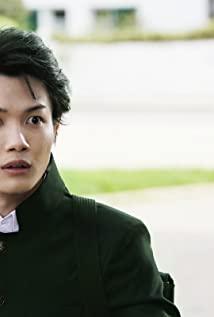And Xin Haicheng's characteristic has always been delicate, whether it is audio-visual or emotional, it is so delicate that it has crossed the boundary of straight men. It can be seen by adding a period to the title of the series.
Or look at the audiovisual effects first. Compare the poster of his previous most famous work "5 Centimeters Per Second" -
Starry sky, dusk, sea of clouds, and similar transparent filters are all his labels. In addition to taking screenshots as wallpapers at any time, another major feature of Xin Haicheng's works is the reproduction of reality. I have seen the production footage of "5 Centimeters Per Second". Makoto Shinkai took real-life photos everywhere, and then painted the scene intact in the storyboard, the high-rise buildings in Tokyo, the barricades along the busy road, The red ceiling lights of the tower cranes shining slowly at night; in addition to these exterior scenes, there are the meals on the table in the apartment and the clothes piled in the laundry basket, which are accurate to the nanometer level of Tokyo's busy urban life.
Not just visual. In the shrine ceremony at night in the countryside, there is no human noise, only ancient and elegant simple music, the rustling sound of the evening wind blowing through the woods, the crackling sound intertwined in the torches, pure and pure, fascinating. (I didn't find the stills of this paragraph, so I put the picture of the grandparents and grandchildren knotting ropes in the country house, similar to the tranquility)
The details of reality are so finely restored that the audience living in Japan will be very immersed. This is also the purpose of accurately restoring the details of reality - Makoto Shinkai is shooting stories of ordinary people in the real world, not Totoro, Doraemon, or Super Saiyan.
So what about emotional nuances? Here we will talk about the problems faced by the use of two-dimensional elements to describe the three-dimensional elements. Although the depiction of the real background is accurate, Xin Haicheng's filter will also beautify it more brilliantly and smooth, which adds to the romance of the story, which is a plus. But when it comes to characters, animation has no advantage. The supernatural nature of My Neighbor Totoro and Super Saiyan allows their authors to fully exaggerate and use their imaginations through animation, while facing Makoto Shinkai's protagonist, an ordinary person in the real world, animation is nowhere near a real actor. Delicate in demeanor and emotion. On the other hand, Makoto Shinkai prefers to use animated characters to make realistic love stories, which fails to give full play to the natural advantages of animation, but magnifies the disadvantage of animation in expressing delicate feelings.
In fact, this is also the case. In addition, he tries to make the audience feel that he is the character in the film. The characters in Makoto Shinkai's animations are always very simple and have no obvious features. They always appear rough and hollow in the gorgeous background. Dramatic camera changes and sensational narration to express the characters' emotions. Therefore, the emotional delicacy of Makoto Shinkai's works is mainly achieved through narration and lyrics.
However, relying solely on the narration lyrics to pile up emotions is relatively risky, because compared with the pictures and plots that are suitable for the audience's brain, the narration and lyrics point out the "central idea" more directly, and provide less space for the audience to interpret it by themselves. Much more, different audiences accept this very differently. For example, the opening sentence of "5 centimeters per second": "Did you know? The falling speed of cherry blossoms is 5 centimeters per second." and "Your name. "The opening chapter (to the effect): "Sometimes when I wake up, I don't know why and burst into tears." Such a narration strikes a resonance in the heart for some audiences, while for another group of audiences, it is very likely that It's "What the hell."
This is also the reason why he was criticized a few times - his previous works represented by "5 Centimeters Per Second", although the lines are very literary and the pictures are very beautiful, the audience is often difficult to feel the protagonists. real body temperature. But on the other hand, this sometimes reflects the loneliness and indifference of urbanites.
Having said so much, then "your name. "What are the breakthroughs that have created a new peak in Xin Haicheng's career?
He moved closer to the mainstream two-dimensional style. Rubbing the chest and grasping the crotch, the sister's complaints, the magical interaction between the sissy and the female man and their original identities are all cute points that everyone likes to see. These two-dimensional rather than three-dimensional features make the first half of the film very enjoyable.
The way the comet hits the earth is actually no stranger to Shinkai Makoto's works. He always likes to tell pure love stories in a magnificent background, because pure love for him is a big event like a comet hitting the earth. But "your name. "Added a relatively tense rescue plot, which also increased the tension of the main plot. These all make up for the emptiness in Makoto Shinkai's previous works.
Of course, impure love is not Shinkai Makoto. Although it is covered with the legend of traveling through time and space, and the legend of animism, etc., the core of this film is still his consistent character - the mutual miss of the city and the countryside that we also saw in "5 Centimeters Per Second", and the reunion after many years. The encounter made everyone feel that "every encounter in the world is a reunion after a long absence." You see, it is far better to let the audience experience it at the end than to sing it hard with lyrics at the beginning.
However, this part is also clearly compromised to the mainstream. Originally, it could have ended when the comet split and became powerless. If you want a little lingering sound, when the two of them are on the top of Shenshan Mountain at dusk, they can hear each other across time and space but cannot see each other, and they cannot touch it in time. It is a good time for the ending, which is sad and unforgettable.
However, they are still arranged to meet after many years, which is also very good. It fulfills the beauty of "meetings are reunions after a long absence". If they can pass this by, it is also evocative and sad. However, they still got to know each other... For mainstream movies, many viewers come to spend some time in their busy and depressing lives, and if they don't show a big reunion, they're afraid they won't buy it. Of course, the confirmation at the end is also very precious, which makes people take a deep breath, but the whole ending seems long.
So, "Your Name. "It is not so much a breakthrough as it is the product of Xin Haicheng's willingness to eat the fireworks of the world and move closer to the mainstream. Of course, it is still gratifying to be able to learn from others' strengths.
WeChat public account: feidududu watching movies (feidudumovie)
View more about Your Name. reviews









